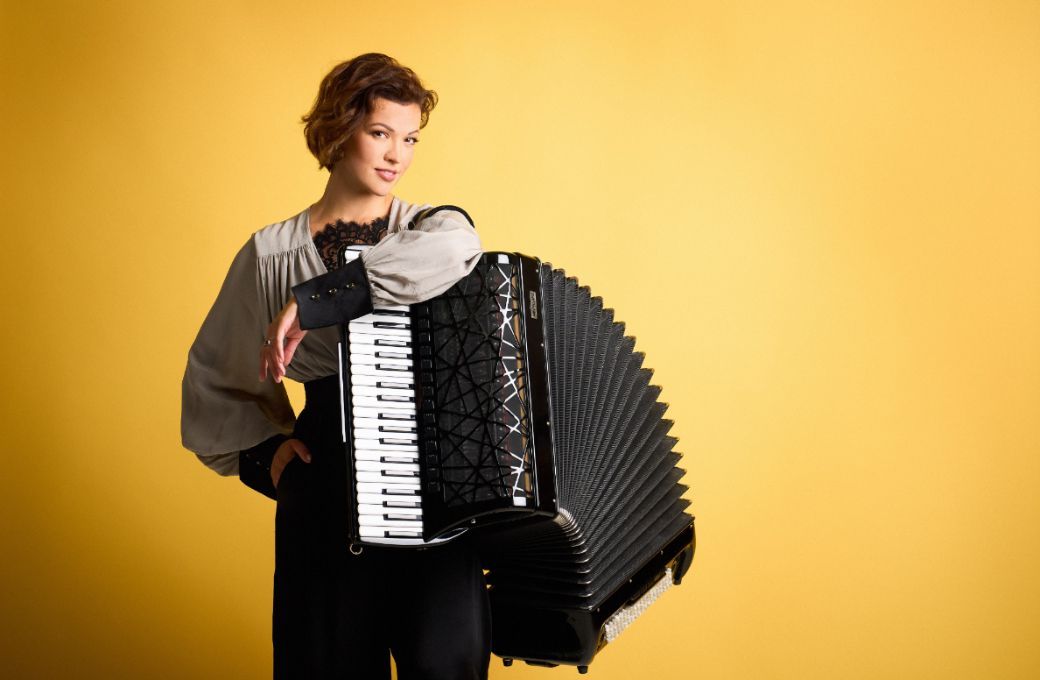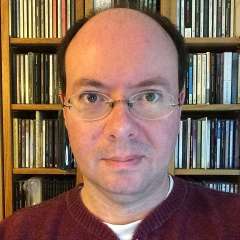Big careers can have strange and unpredictable beginnings, and in the case of Latvian musician Ksenija Sidorova, her journey to becoming one of classical music’s most well-known accordionists could hardly have been more low-key, being practically accidental. It began, she says, with her grandmother. “When she introduced me to the accordion, it was purely by chance. She thought, ‘let’s pick a hobby’ – it was something she thought would be fun to do over the summer. And by the end of the summer I could pull off playing a few songs with her.”

Next to her secondary school was a music school. “I was seven at the time. My mom asked me, ‘Do you want to go in?’ We were greeted by some staff of this school, and they said, ‘Does she play anything?’ ‘Oh yes, she plays the accordion!’ They said, ‘How odd! Do you want to play the accordion?’ Apparently I said yes – and this is how it began.”
Things became more serious a few years later. “I was around 12 years old, and I had to change my instrument. My parents had to sacrifice a lot to save up and buy me a better instrument. And the question was simply, ‘Do you want to continue playing?’” She did, and she got her new accordion. “I remember going to pick it up, playing the first note, and crying at how good it sounded.” Continuing to play and improve – “I liked practising by that point” – the time came to decide where to go to study more intensively. Two weeks trying out a music college in Riga didn’t work out, but the unexpected next step came from the Royal Academy of Music in London.
“Owen Murray, who still teaches there, got hold of my little demo disc and invited me to play for him. So my mother and I packed our bags in the beginning of December.” They arrived, only to find themselves in the midst of all the prospective students attending auditions. “I said, ‘Great, that doesn’t apply to me. I’m still just 16 and didn’t graduate from my school.’” She went and played for Murray, and was then asked to play again, this time for the then principal, Sir Curtis Price. The result was Sidorova being offered a scholarship to begin undergraduate studies, an opportunity she regards as one of the highlights of her musical life. “I didn’t know it was possible. There were people who really believed.”
An interest in both old and new music was important to her from the outset. Her first professionally-produced solo album, Classical Accordion (2011), opens with Arne Nordheim’s Flashing, and features works by Schnittke, Berio – the challenging thirteenth Sequenza – and Yuji Takahashi alongside music by Bach, Scarlatti and Mozart. The Nordheim was especially important to Sidorova. “It’s my favourite. I love this piece, and it was my introduction to contemporary music when I was in London, and to beautiful sound production on the accordion, which is an art on its own. This piece is so delicate.”
Sidorova’s interest in new music led to her actively seeking out new repertoire for the instrument. “It was a dream that I would be collaborating. There wasn’t so much repertoire, so we knew we needed to create it.” During her time studying at the Academy, she became friends with Bulgarian composer Dobrinka Tabakova. Sidorova asked if Tabakova had anything she could play, and received a movement from her Piano Concerto, “and I said: I love this piece! Do you mind if I do something with it?” Tabakova didn’t mind, and the reworked result was Horizons – included on her 2024 album Crossroads – and now Tabakova has composed a new concerto specifically for her.
A few weeks after its world premiere in May, Sidorova brought Tabakova’s Concerto to the composer’s native Bulgaria, performing it on 19th June in Sofia, with the Sofia Philharmonic conducted by Nayden Todorov. She hadn’t performed with the Sofia orchestra before, but was looking forward to it, in no small part because Tabakova would be attending to hear its Bulgarian premiere. “She’ll be there, and she’s a very warm person, so I feel her support.”
Even though Sidorova wasn’t actively involved in its composition – “I’m not a composer, I don’t want to interfere”, she says – the new work was actively inspired by her playing. I asked Tabakova about this, and she recalled, “I heard Ksenija perform an arrangement of a Bulgarian folk dance with mandolinist Avi Avital, which was at the back of my mind when writing the multiple time-signatured final movement.” This leans in to Sidorova’s perceptions of the nature of the accordion. “It’s multifaceted,” she explains, “I never want to forget its roots in folk music. Composers often turn to the folk side of it. They always include something, like Dobrinka is doing. The last movement is very folky. I think it’s a big part of the instrument.”
Considering the poetic and evocative titles Tabakova tends to give her compositions, it seems surprising that this new work has an entirely functional title, Concerto for Accordion and Orchestra. Yet its individual movements – ‘Blazing Ground’, ‘Whispered Memory’, and ‘Ancient Patterns’ – shed some light on the subject matter, rooted in considerations of the relationship between machines (such as technology and AI) and the soul, summarised by the question, in Tabakova’s words, of “how will our fragile human souls cope with a virtual reality, which aims to substitute real connection and curiosity?”
Thinking about this tension between humans and machines gets me wondering to what extent Sidorova regards her accordion as a machine, something external, or more inextricably part of herself. “It’s a child, it’s kid number four,” she says, referencing her three (human) children, and though she’s quick to point out “I’m not that crazy that I give it a name”, admits that “actually I sometimes call it The Beast.” Her description makes the accordion sound like the essence of Tabakova’s concerto, something combining real and artificial life. “There’s all these metal parts to it, so yes, it is a machine. But then it has bellows, so it’s a breathing creature.” That breath, she emphasises, has given voice to people through the ages. “It’s a traditional instrument in so many countries, an accompaniment to many songs. It brings out joy, sorrow – it’s emotional.” This informs her attitude to choices of repertoire. “I think I’ve found my language. I tend to follow my heart – I want to like the music that I perform because, if I don’t believe in it, I’m never going to convince the audience to believe in it.”
She describes the itinerant soloist experience, moving from orchestra to orchestra, as “a little bit like being adopted by a family for a little period of time.” This ‘adoption’ process involves Sidorova continually making adjustments to the way she utilises her instrument. “It’s a journey, always, with orchestras. I love it, I really do, because there’s so many sounds you can work with. With Dobrinka’s piece, I can’t wait to get into the first rehearsal because I’m sure, with the registration, I’ll have to change a lot. And it’s a bit of pressure, you know,” she says, smiling broadly, “it’s happening very fast!”
Sidorova’s relationship with contemporary music is deep and long-lasting, and her repertoire of concertos includes Vaclav Trojan’s Fairy Tales, Piazzolla’s Concerto for Bandoneon and Chamber Orchestra ‘Aconcagua’ (Piazzolla features extensively in her output) and Artūrs Maskats’ What The Wind Told Over The Sea, all of which she has recorded. Concertos also feature in her future plans, with a new one coming from Turkish composer Fazıl Say, and a forthcoming recording featuring concertos from two fellow Baltic composers, Erkki-Sven Tüür’s Prophecy and Tõnu Kõrvits’ Dances. More immediately, she’ll be participating in a residency at the Bodensee Festival in May and June, and making her debut at Carnegie Hall in a solo recital in November.
I ask if she sees her role as an ambassador, advocating for the accordion in contemporary music. “Absolutely. My teachers started this journey, they were the true pioneers. It’s a big task, so I just continue doing that, and of course there’s a lot of colleagues of mine nowadays. The calling is there, and they’re doing the same thing. So I think we’re all raising awareness.” Her advice to prospective accordionists is simple: “Be open to everything. This is your time, you’ve got the time, don’t waste it. Enjoy it!”
This article was sponsored by Sofia Philharmonic Orchestra.


